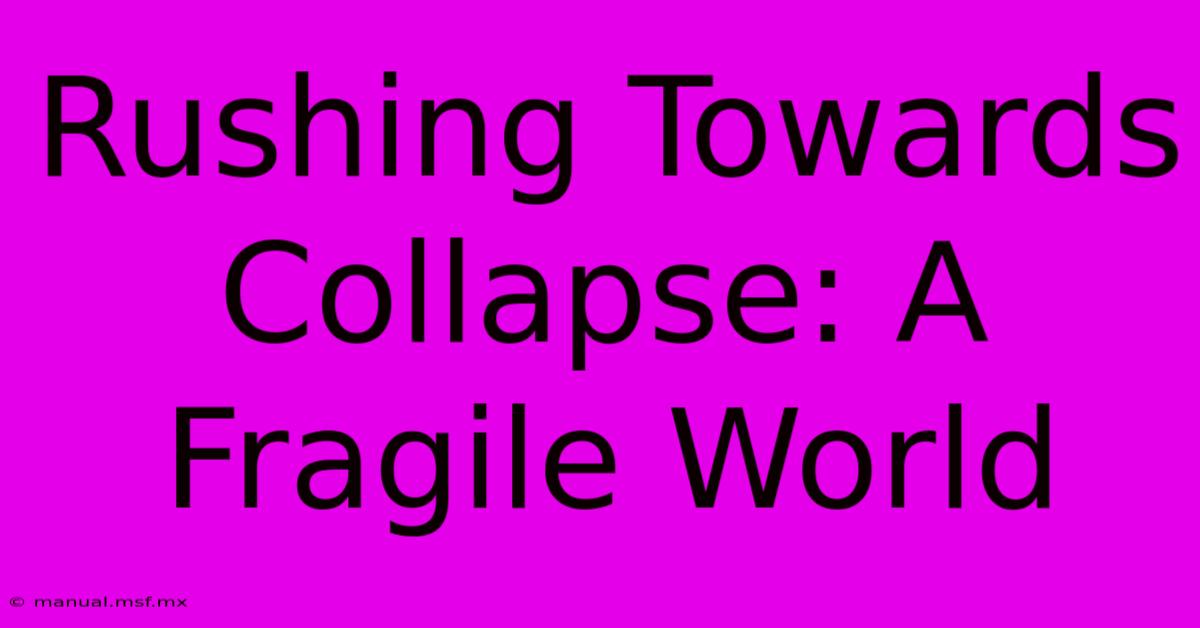Rushing Towards Collapse: A Fragile World

Discover more detailed and exciting information on our website. Click the link below to start your adventure: Visit Best Website. Don't miss out!
Table of Contents
Rushing Towards Collapse: A Fragile World - Unveiling the Warning Signs of a Crumbling System
Is our world on the brink of collapse? This question, once confined to dystopian fiction, is now a chillingly realistic concern. The world is in a state of accelerating fragility, with interconnected systems teetering on the edge of failure. The consequences of inaction could be catastrophic, affecting every facet of our lives. This article delves into the warning signs of a crumbling system, analyzing the underlying causes and offering a path towards a more resilient future.
Editor Note: This exploration of "Rushing Towards Collapse: A Fragile World" is a call to action for understanding the challenges we face and the importance of proactive solutions.
Understanding the fragility of our world is crucial for survival and thriving. This article provides a comprehensive analysis of the interconnected systems, offering actionable insights into the causes of instability and potential paths towards a more sustainable future.
Our research involved examining numerous reports from reputable organizations like the World Economic Forum, the Intergovernmental Panel on Climate Change (IPCC), and the Stockholm Resilience Centre. We analyzed trends across diverse fields like climate change, social inequality, resource depletion, and political instability. By combining this data with expert opinions and scientific evidence, we've compiled this guide to shed light on the precarious state of our world.
Key Takeaways
| Issue | Description |
|---|---|
| Climate Change | Rising temperatures, extreme weather events, and sea-level rise are causing widespread disruption and increasing human vulnerability. |
| Biodiversity Loss | The rapid decline of species and ecosystems threatens food security, water resources, and vital ecosystem services. |
| Resource Depletion | Overconsumption of resources like water, minerals, and fossil fuels is straining our planet's capacity and leading to scarcity. |
| Social Inequality | Growing disparities in wealth, power, and access to resources are fueling unrest and undermining societal stability. |
| Political Instability | Polarization, corruption, and ineffective governance are hindering collaboration and slowing down progress towards sustainable solutions. |
| Technological Disruption | Rapid advancements in artificial intelligence, automation, and biotechnology are creating new challenges and opportunities for humanity. |
From Fragility to Resilience
The world's fragility stems from a combination of factors:
1. Climate Change: This is the defining crisis of our time, impacting every aspect of our lives. From extreme weather events to rising sea levels, climate change threatens livelihoods, food security, and infrastructure.
2. Biodiversity Loss: The extinction rate is accelerating, eroding the foundation of our ecosystems. This loss threatens essential services like pollination, water purification, and climate regulation.
3. Resource Depletion: We are exceeding the Earth's capacity to regenerate resources, leading to scarcity, conflict, and environmental degradation.
4. Social Inequality: Growing disparities in wealth, power, and opportunity are breeding resentment, instability, and undermining the social contract.
5. Political Instability: Political polarization, corruption, and ineffective governance are hindering our ability to tackle global challenges and build a more just and sustainable future.
6. Technological Disruption: The rapid pace of technological change presents both opportunities and challenges. While new technologies can offer solutions, they also bring risks like job displacement, algorithmic bias, and the potential for misuse.
Facing the Challenges
The path towards a more resilient future requires a multifaceted approach:
1. Addressing Climate Change: Transitioning to clean energy sources, reducing greenhouse gas emissions, and adapting to the impacts of climate change are paramount.
2. Protecting Biodiversity: Conserving ecosystems, restoring degraded lands, and promoting sustainable practices are crucial to preserving the web of life.
3. Managing Resource Depletion: Promoting circular economy models, reducing consumption, and investing in renewable resources are necessary steps towards sustainability.
4. Reducing Inequality: Promoting fair wages, access to education and healthcare, and empowering marginalized communities are essential for creating a just and equitable society.
5. Strengthening Governance: Investing in transparency, accountability, and effective governance mechanisms are essential for building trust and enabling collective action.
6. Navigating Technological Disruption: Leveraging technology responsibly, addressing ethical concerns, and ensuring equitable access are crucial for harnessing its potential for good.
Conclusion:
The world is facing a multitude of challenges, but they are not insurmountable. By understanding the underlying causes of fragility and implementing robust solutions, we can build a more resilient future. This requires collective action, global cooperation, and a commitment to long-term sustainability. The time for action is now. Let's work together to build a world that is not only sustainable but also equitable and prosperous for all.

Thank you for visiting our website wich cover about Rushing Towards Collapse: A Fragile World. We hope the information provided has been useful to you. Feel free to contact us if you have any questions or need further assistance. See you next time and dont miss to bookmark.
Also read the following articles
| Article Title | Date |
|---|---|
| Baltic Rail Line Construction Gets Funding Boost | Nov 14, 2024 |
| Gabbard Named Dni By Trump | Nov 14, 2024 |
| Wembanyama Explodes For 50 Points Leads Team | Nov 14, 2024 |
| Australien Hofft Auf Neuen Trainer Effekt | Nov 14, 2024 |
| Key Protein Found In Parkinsons Disease Spread Israeli Study | Nov 14, 2024 |
| Airfryers Franse Consumentenwaarschuwing | Nov 14, 2024 |
| Langkah Cek Nik Penerima Bansos 2024 | Nov 14, 2024 |
| Mayr Melnhof Flierman Uebernimmt Vorstand | Nov 14, 2024 |
| Lnh Ovechkin La Quete Des Records | Nov 14, 2024 |
| Cara Mudah Cek Penerima Bansos | Nov 14, 2024 |
